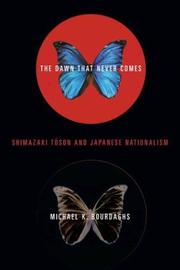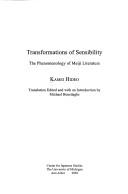| Listing 1 - 10 of 14 | << page >> |
Sort by
|
Book
ISBN: 9780231503419 Year: 2003 Publisher: New York, NY
Abstract | Keywords | Export | Availability | Bookmark
 Loading...
Loading...Choose an application
- Reference Manager
- EndNote
- RefWorks (Direct export to RefWorks)

ISBN: 9780231503419 9780231129800 Year: 2003 Publisher: New York, N.Y. Columbia University Press
Abstract | Keywords | Export | Availability | Bookmark
 Loading...
Loading...Choose an application
- Reference Manager
- EndNote
- RefWorks (Direct export to RefWorks)
Book
ISBN: 1478013699 1478014628 1478021926 Year: 2021 Publisher: Duke University Press
Abstract | Keywords | Export | Availability | Bookmark
 Loading...
Loading...Choose an application
- Reference Manager
- EndNote
- RefWorks (Direct export to RefWorks)

ISBN: 0231129807 1322353115 0231503415 Year: 2003 Publisher: New York Columbia university press
Abstract | Keywords | Export | Availability | Bookmark
 Loading...
Loading...Choose an application
- Reference Manager
- EndNote
- RefWorks (Direct export to RefWorks)
A critical rethinking of theories of national imagination, The Dawn That Never Comes offers the most detailed reading to date in English of one of modern Japan's most influential poets and novelists, Shimazaki Toson (1872-1943). It also reveals how Toson's works influenced the production of a fluid, shifting form of national imagination that has characterized twentieth-century Japan. Analyzing Toson's major works, Michael K. Bourdaghs demonstrates that the construction of national imagination requires a complex interweaving of varied-and sometimes contradictory-figures for imagining the national community. Many scholars have shown, for example, that modern hygiene has functioned in nationalist thought as a method of excluding foreign others as diseased. This study explores the multiple images of illness appearing in Toson's fiction to demonstrate that hygiene employs more than one model of pathology, and it reveals how this multiplicity functioned to produce the combinations of exclusion and assimilation required to sustain a sense of national community. Others have argued that nationalism is inherently ambivalent and self-contradictory; Bourdaghs shows more concretely both how this is so and why it is necessary and provides, in the process, a new way of thinking about national imagination. Individual chapters take up such issues as modern medicine and the discourses of national health; ideologies of the family and its representation in modern literary works; the gendering of the canon of national literature; and the multiple forms of space and time that narratives of national history require.
J5931 --- J5500.70 --- J4122 --- J2284.70 --- Japan: Literature -- modern fiction and prose (1868- ) -- criticism --- Japan: Literature -- history and criticism -- modern, Kindai (1850s- ), bakumatsu, Meiji, Taishō --- Japan: Sociology and anthropology -- nationalism --- Japan: Genealogy and biography -- biographies -- kindai (1850s- ), bakumatsu, meiji, taishō --- Nationalism in literature. --- Shimazaki, Tōson, --- Criticism and interpretation. --- Nationalism in literature --- Shimazaki, Tōson, --- Shimazaki, Haruki, --- Simadzaki-Toson, --- Tōson, --- Simadzaki, Toson, --- Tao-chʻi, Tʻeng-tsʻun, --- 岛崎藤村, --- 島埼藤村, --- 島崎籐村, --- 島崎藤村, --- 島琦藤村, --- Shimazaki, Tōson
Book
ISBN: 0472127489 1929280602 0472901435 9780472127481 9781929280605 Year: 2010 Publisher: Ann Arbor, Michigan : University of Michigan Press,
Abstract | Keywords | Export | Availability | Bookmark
 Loading...
Loading...Choose an application
- Reference Manager
- EndNote
- RefWorks (Direct export to RefWorks)
The 1970s and 1980s saw a revolution in Japanese literary criticism. A new generation of scholars and critics, many of them veterans of 1960s political activism, arose in revolt against the largely positivistic methodologies that had hitherto dominated postwar literary studies. Creatively refashioning approaches taken from the field of linguistics, the new scholarship challenged orthodox interpretations, often introducing new methodologies in the process: structuralism, semiotics, and phenomenological linguistics, among others. The radical changes introduced then continue to reverberate today, shaping the way Japanese literature is studied both at home and abroad.The Linguistic Turn in Contemporary Japanese Literary Studies is the first critical study of this revolution to appear in English. It includes translations of landmark essays published in the 1970s and 1980s by such influential figures as Noguchi Takehiko, Kamei Hideo, Mitani Kuniaki, and Hirata Yumi. It also collects nine new essays that reflect critically on the emergence of linguistics-based literary criticism and theory in Japan, exploring both the novel possibilities such theory created and the shortcomings that could not be overcome. Scholars from a variety of disciplines and fields probe the political and intellectual implications of this transformation and explore the exciting new pathways it opened up for the study of modern Japanese literature.
Linguistics in literature. --- Japanese literature --- History and criticism --- Theory, etc.
Book
ISBN: 9780231158749 0231158742 9780231158756 0231158750 9780231530262 0231530269 1280599006 9786613628831 9781280599002 Year: 2012 Publisher: New York
Abstract | Keywords | Export | Availability | Bookmark
 Loading...
Loading...Choose an application
- Reference Manager
- EndNote
- RefWorks (Direct export to RefWorks)
From the beginning of the American occupation in 1945 to the post-bubble period of the early 1990s, popular music provided Japanese listeners with a much-needed release, channeling their desires, fears, and frustrations over an ever-shifting geopolitical reality into a pleasurable and fluid art. Pop music allowed Japanese artists and audiences to assume various identities, reflecting the country's uncomfortable position under American hegemony. Michael Bourdaghs composes the first English-language study of this phenomenon, considering genres as diverse as boogie-woogie, rockabilly, enka,

ISBN: 1929280122 0472901427 9780472127474 9780472901425 0472127470 9781929280124 Year: 2020 Publisher: University of Michigan Press
Abstract | Keywords | Export | Availability | Bookmark
 Loading...
Loading...Choose an application
- Reference Manager
- EndNote
- RefWorks (Direct export to RefWorks)
First published in Japan in 1983, this book is now a classic in modern Japanese literary studies. Covering an astonishing range of texts from the Meiji period (1868-1912), it presents sophisticated analyses of the ways that experiments in literary language produced multiple new-and sometimes revolutionary-forms of sensibility and subjectivity. Along the way, Kamei Hideo carries on an extended debate with Western theorists such as Saussure, Bakhtin, and Lotman, as well as with such contemporary Japanese critics as Karatani Kojin and Noguchi Takehiko.Transformations of Sensibility deliberately challenges conventional wisdom about the rise of modern literature in Japan and offers highly original close readings of works by such writers as Futabatei Shimei, Tsubouchi Shoyo, Higuchi Ichiyo, and Izumi Kyoka, as well as writers previously ignored by most scholars. It also provides a new critical theorization of the relationship between language and sensibility, one that links the specificity of Meiji literature to broader concerns that transcend the field of Japanese literary studies. Available in English translation for the first time, it includes a new preface by the author and an introduction by the translation editor that explain the theoretical and historical contexts in which the work first appeared.
Japanese literature --- J5500.70 --- J5509 --- J5930 --- History and criticism --- Japan: Literature -- history and criticism -- modern, Kindai (1850s- ), bakumatsu, Meiji, Taishō --- Japan: Literature -- theory, methodology and philosophy --- Japan: Literature -- modern fiction and prose (1868- ) --- History and criticism. --- Social Science / Cultural & Ethnic Studies / General --- Social Science --- Social sciences
Book
ISBN: 0472127470 Year: 2002 Publisher: Ann Arbor, Michigan : University of Michigan Press,
Abstract | Keywords | Export | Availability | Bookmark
 Loading...
Loading...Choose an application
- Reference Manager
- EndNote
- RefWorks (Direct export to RefWorks)
Book
ISBN: 9781929280605 9780472901432 Year: 2020 Publisher: University of Michigan Press
Abstract | Keywords | Export | Availability | Bookmark
 Loading...
Loading...Choose an application
- Reference Manager
- EndNote
- RefWorks (Direct export to RefWorks)
Book
ISBN: 073918072X 0739180738 0739180746 9780739180747 9780739180723 Year: 2018 Publisher: Lanham
Abstract | Keywords | Export | Availability | Bookmark
 Loading...
Loading...Choose an application
- Reference Manager
- EndNote
- RefWorks (Direct export to RefWorks)
Criticism --- Japanese literature --- History --- History and criticism. --- Evaluation of literature --- Literary criticism --- Literature --- Rhetoric --- Aesthetics --- Technique --- Evaluation
| Listing 1 - 10 of 14 | << page >> |
Sort by
|

 Search
Search Feedback
Feedback About UniCat
About UniCat  Help
Help News
News